BMBM6018 - Ted Baker: Analysis of Audit Fraud, Error, and COVID-19
VerifiedAdded on 2023/06/16
|12
|4341
|357
Report
AI Summary
This report provides a comprehensive analysis of audit fraud and error within the context of Ted Baker, a British luxury clothing brand. It begins by summarizing the company's main operating activities and then delves into the responsibilities of management and external auditors in preventing and detecting fraud, referencing relevant International Standards on Auditing (ISAs). The report further elaborates on how the COVID-19 crisis heightened the risk of fraud and improper financial reporting, specifically addressing issues faced by Ted Baker. It critically analyzes the company's corporate governance responses to these risks, including actions taken by the board of directors, audit committee, and internal control systems. Finally, it discusses the ethical threats faced by external auditors due to the pandemic and recommends safeguards to maintain ethical conduct in auditing, ensuring fair and reliable financial statements. This assignment solution is available on Desklib, where students can find more resources like past papers and solved assignments.
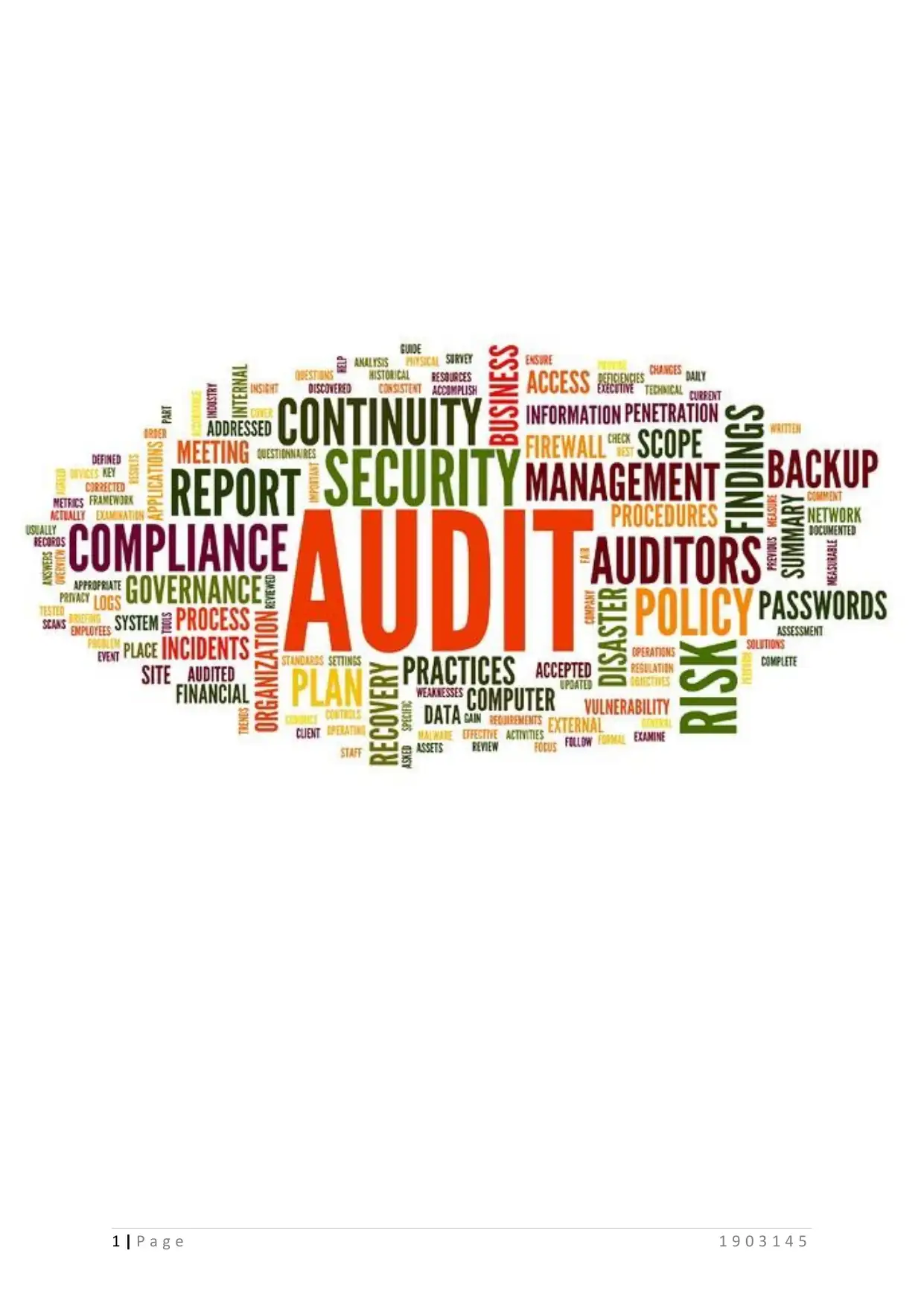
1 | P a g e 1 9 0 3 1 4 5
Paraphrase This Document
Need a fresh take? Get an instant paraphrase of this document with our AI Paraphraser
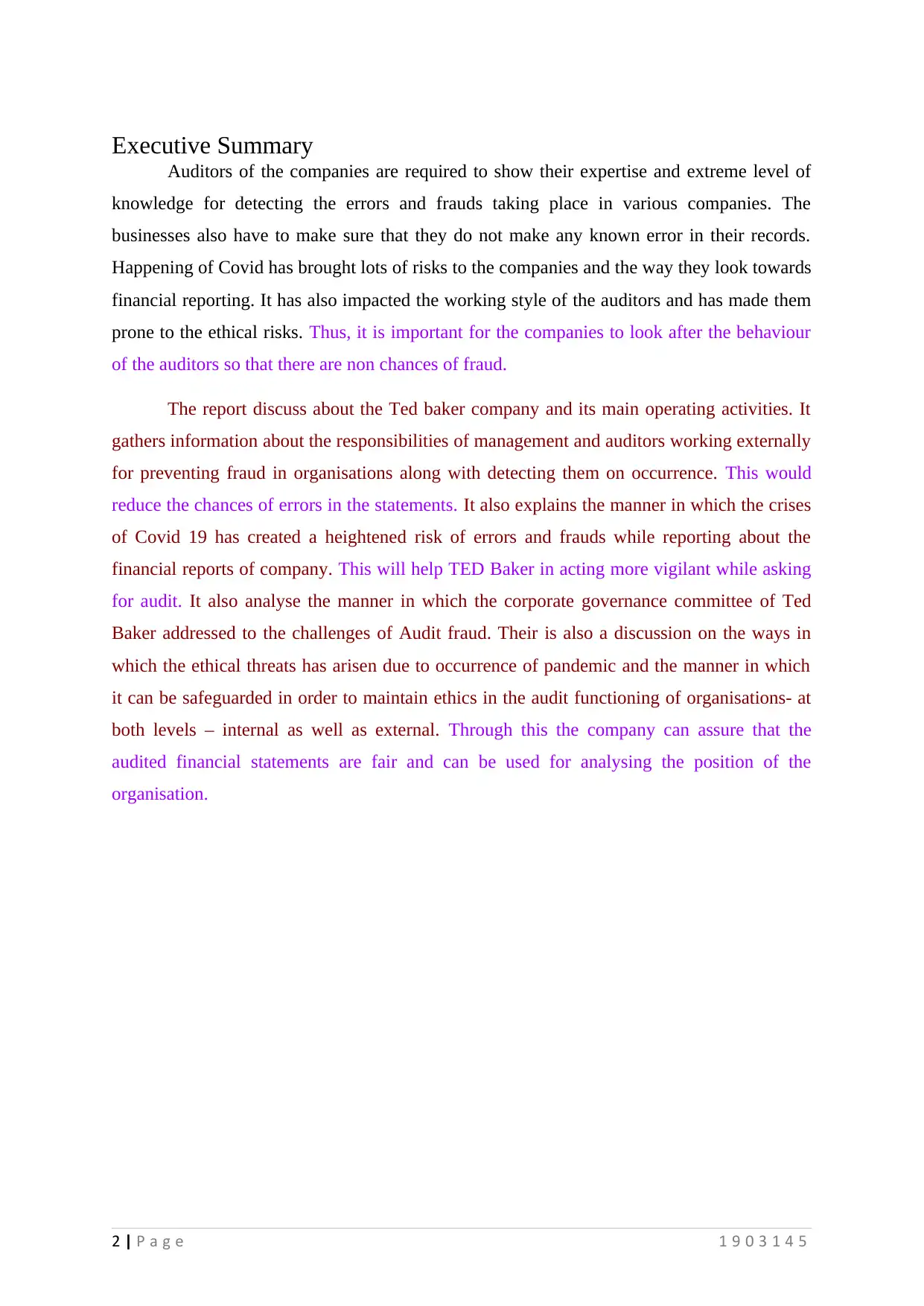
Executive Summary
Auditors of the companies are required to show their expertise and extreme level of
knowledge for detecting the errors and frauds taking place in various companies. The
businesses also have to make sure that they do not make any known error in their records.
Happening of Covid has brought lots of risks to the companies and the way they look towards
financial reporting. It has also impacted the working style of the auditors and has made them
prone to the ethical risks. Thus, it is important for the companies to look after the behaviour
of the auditors so that there are non chances of fraud.
The report discuss about the Ted baker company and its main operating activities. It
gathers information about the responsibilities of management and auditors working externally
for preventing fraud in organisations along with detecting them on occurrence. This would
reduce the chances of errors in the statements. It also explains the manner in which the crises
of Covid 19 has created a heightened risk of errors and frauds while reporting about the
financial reports of company. This will help TED Baker in acting more vigilant while asking
for audit. It also analyse the manner in which the corporate governance committee of Ted
Baker addressed to the challenges of Audit fraud. Their is also a discussion on the ways in
which the ethical threats has arisen due to occurrence of pandemic and the manner in which
it can be safeguarded in order to maintain ethics in the audit functioning of organisations- at
both levels – internal as well as external. Through this the company can assure that the
audited financial statements are fair and can be used for analysing the position of the
organisation.
2 | P a g e 1 9 0 3 1 4 5
Auditors of the companies are required to show their expertise and extreme level of
knowledge for detecting the errors and frauds taking place in various companies. The
businesses also have to make sure that they do not make any known error in their records.
Happening of Covid has brought lots of risks to the companies and the way they look towards
financial reporting. It has also impacted the working style of the auditors and has made them
prone to the ethical risks. Thus, it is important for the companies to look after the behaviour
of the auditors so that there are non chances of fraud.
The report discuss about the Ted baker company and its main operating activities. It
gathers information about the responsibilities of management and auditors working externally
for preventing fraud in organisations along with detecting them on occurrence. This would
reduce the chances of errors in the statements. It also explains the manner in which the crises
of Covid 19 has created a heightened risk of errors and frauds while reporting about the
financial reports of company. This will help TED Baker in acting more vigilant while asking
for audit. It also analyse the manner in which the corporate governance committee of Ted
Baker addressed to the challenges of Audit fraud. Their is also a discussion on the ways in
which the ethical threats has arisen due to occurrence of pandemic and the manner in which
it can be safeguarded in order to maintain ethics in the audit functioning of organisations- at
both levels – internal as well as external. Through this the company can assure that the
audited financial statements are fair and can be used for analysing the position of the
organisation.
2 | P a g e 1 9 0 3 1 4 5
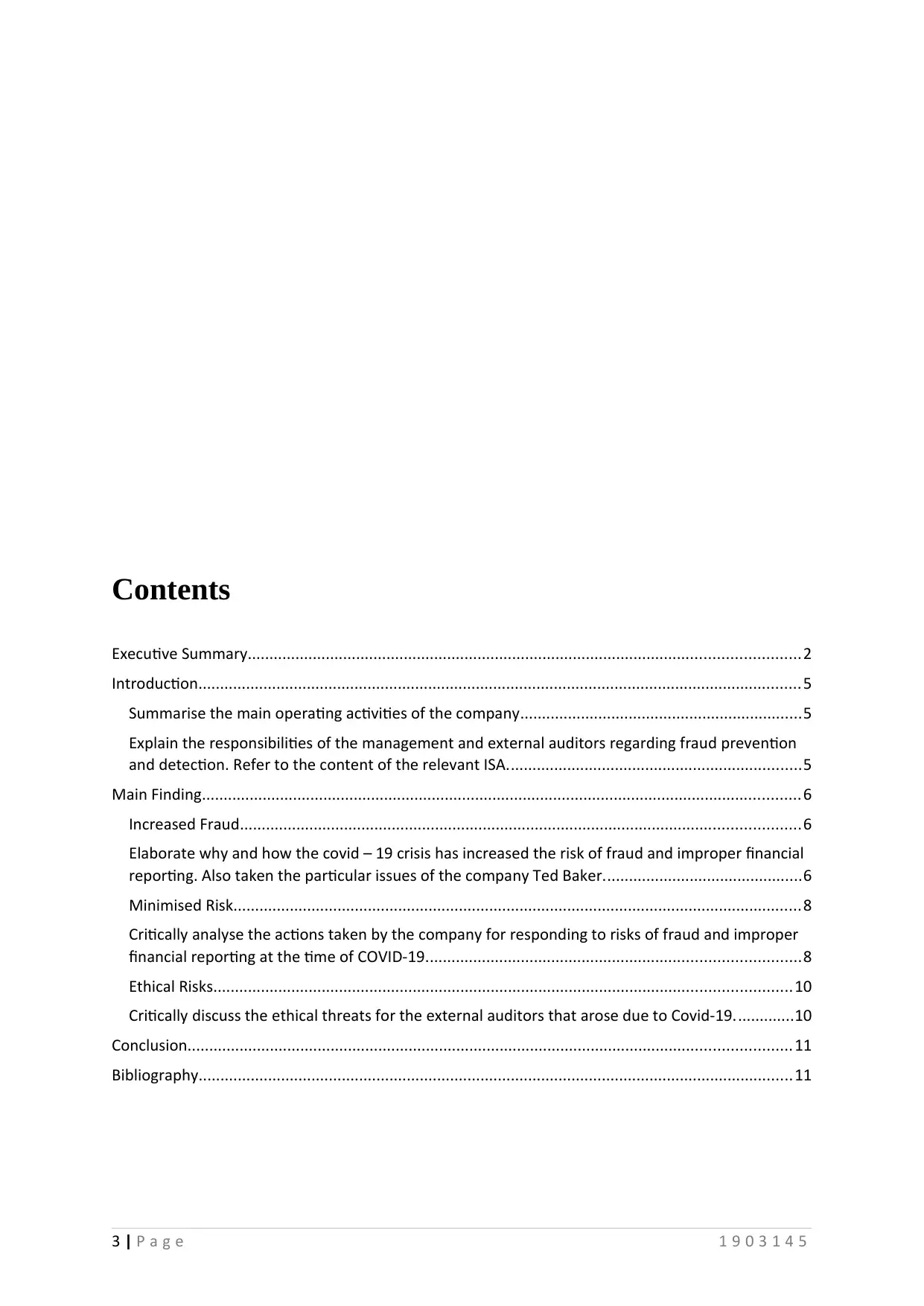
Contents
Executive Summary...............................................................................................................................2
Introduction...........................................................................................................................................5
Summarise the main operating activities of the company.................................................................5
Explain the responsibilities of the management and external auditors regarding fraud prevention
and detection. Refer to the content of the relevant ISA....................................................................5
Main Finding..........................................................................................................................................6
Increased Fraud.................................................................................................................................6
Elaborate why and how the covid – 19 crisis has increased the risk of fraud and improper financial
reporting. Also taken the particular issues of the company Ted Baker..............................................6
Minimised Risk...................................................................................................................................8
Critically analyse the actions taken by the company for responding to risks of fraud and improper
financial reporting at the time of COVID-19......................................................................................8
Ethical Risks.....................................................................................................................................10
Critically discuss the ethical threats for the external auditors that arose due to Covid-19..............10
Conclusion...........................................................................................................................................11
Bibliography.........................................................................................................................................11
3 | P a g e 1 9 0 3 1 4 5
Executive Summary...............................................................................................................................2
Introduction...........................................................................................................................................5
Summarise the main operating activities of the company.................................................................5
Explain the responsibilities of the management and external auditors regarding fraud prevention
and detection. Refer to the content of the relevant ISA....................................................................5
Main Finding..........................................................................................................................................6
Increased Fraud.................................................................................................................................6
Elaborate why and how the covid – 19 crisis has increased the risk of fraud and improper financial
reporting. Also taken the particular issues of the company Ted Baker..............................................6
Minimised Risk...................................................................................................................................8
Critically analyse the actions taken by the company for responding to risks of fraud and improper
financial reporting at the time of COVID-19......................................................................................8
Ethical Risks.....................................................................................................................................10
Critically discuss the ethical threats for the external auditors that arose due to Covid-19..............10
Conclusion...........................................................................................................................................11
Bibliography.........................................................................................................................................11
3 | P a g e 1 9 0 3 1 4 5
⊘ This is a preview!⊘
Do you want full access?
Subscribe today to unlock all pages.

Trusted by 1+ million students worldwide
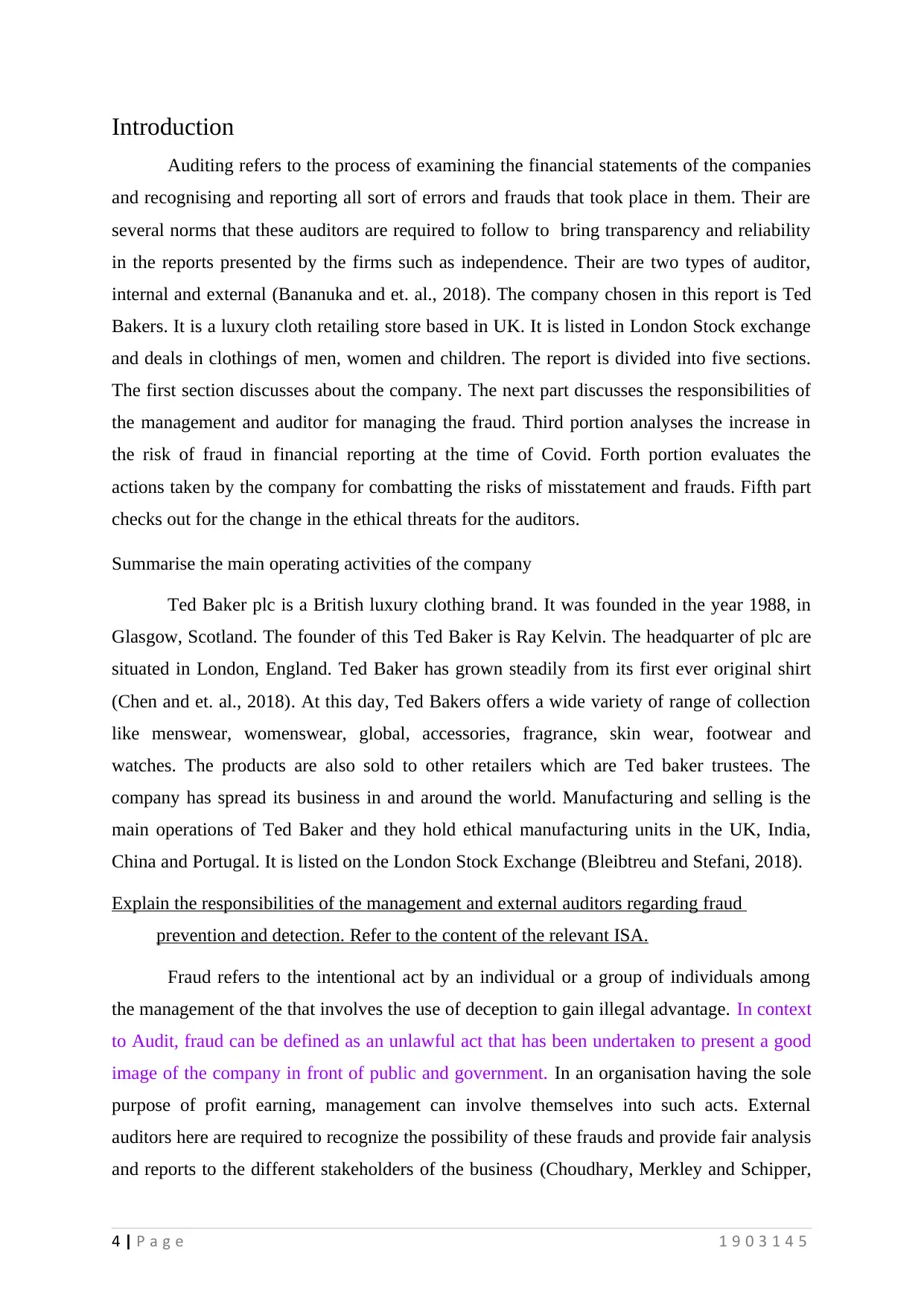
Introduction
Auditing refers to the process of examining the financial statements of the companies
and recognising and reporting all sort of errors and frauds that took place in them. Their are
several norms that these auditors are required to follow to bring transparency and reliability
in the reports presented by the firms such as independence. Their are two types of auditor,
internal and external (Bananuka and et. al., 2018). The company chosen in this report is Ted
Bakers. It is a luxury cloth retailing store based in UK. It is listed in London Stock exchange
and deals in clothings of men, women and children. The report is divided into five sections.
The first section discusses about the company. The next part discusses the responsibilities of
the management and auditor for managing the fraud. Third portion analyses the increase in
the risk of fraud in financial reporting at the time of Covid. Forth portion evaluates the
actions taken by the company for combatting the risks of misstatement and frauds. Fifth part
checks out for the change in the ethical threats for the auditors.
Summarise the main operating activities of the company
Ted Baker plc is a British luxury clothing brand. It was founded in the year 1988, in
Glasgow, Scotland. The founder of this Ted Baker is Ray Kelvin. The headquarter of plc are
situated in London, England. Ted Baker has grown steadily from its first ever original shirt
(Chen and et. al., 2018). At this day, Ted Bakers offers a wide variety of range of collection
like menswear, womenswear, global, accessories, fragrance, skin wear, footwear and
watches. The products are also sold to other retailers which are Ted baker trustees. The
company has spread its business in and around the world. Manufacturing and selling is the
main operations of Ted Baker and they hold ethical manufacturing units in the UK, India,
China and Portugal. It is listed on the London Stock Exchange (Bleibtreu and Stefani, 2018).
Explain the responsibilities of the management and external auditors regarding fraud
prevention and detection. Refer to the content of the relevant ISA.
Fraud refers to the intentional act by an individual or a group of individuals among
the management of the that involves the use of deception to gain illegal advantage. In context
to Audit, fraud can be defined as an unlawful act that has been undertaken to present a good
image of the company in front of public and government. In an organisation having the sole
purpose of profit earning, management can involve themselves into such acts. External
auditors here are required to recognize the possibility of these frauds and provide fair analysis
and reports to the different stakeholders of the business (Choudhary, Merkley and Schipper,
4 | P a g e 1 9 0 3 1 4 5
Auditing refers to the process of examining the financial statements of the companies
and recognising and reporting all sort of errors and frauds that took place in them. Their are
several norms that these auditors are required to follow to bring transparency and reliability
in the reports presented by the firms such as independence. Their are two types of auditor,
internal and external (Bananuka and et. al., 2018). The company chosen in this report is Ted
Bakers. It is a luxury cloth retailing store based in UK. It is listed in London Stock exchange
and deals in clothings of men, women and children. The report is divided into five sections.
The first section discusses about the company. The next part discusses the responsibilities of
the management and auditor for managing the fraud. Third portion analyses the increase in
the risk of fraud in financial reporting at the time of Covid. Forth portion evaluates the
actions taken by the company for combatting the risks of misstatement and frauds. Fifth part
checks out for the change in the ethical threats for the auditors.
Summarise the main operating activities of the company
Ted Baker plc is a British luxury clothing brand. It was founded in the year 1988, in
Glasgow, Scotland. The founder of this Ted Baker is Ray Kelvin. The headquarter of plc are
situated in London, England. Ted Baker has grown steadily from its first ever original shirt
(Chen and et. al., 2018). At this day, Ted Bakers offers a wide variety of range of collection
like menswear, womenswear, global, accessories, fragrance, skin wear, footwear and
watches. The products are also sold to other retailers which are Ted baker trustees. The
company has spread its business in and around the world. Manufacturing and selling is the
main operations of Ted Baker and they hold ethical manufacturing units in the UK, India,
China and Portugal. It is listed on the London Stock Exchange (Bleibtreu and Stefani, 2018).
Explain the responsibilities of the management and external auditors regarding fraud
prevention and detection. Refer to the content of the relevant ISA.
Fraud refers to the intentional act by an individual or a group of individuals among
the management of the that involves the use of deception to gain illegal advantage. In context
to Audit, fraud can be defined as an unlawful act that has been undertaken to present a good
image of the company in front of public and government. In an organisation having the sole
purpose of profit earning, management can involve themselves into such acts. External
auditors here are required to recognize the possibility of these frauds and provide fair analysis
and reports to the different stakeholders of the business (Choudhary, Merkley and Schipper,
4 | P a g e 1 9 0 3 1 4 5
Paraphrase This Document
Need a fresh take? Get an instant paraphrase of this document with our AI Paraphraser
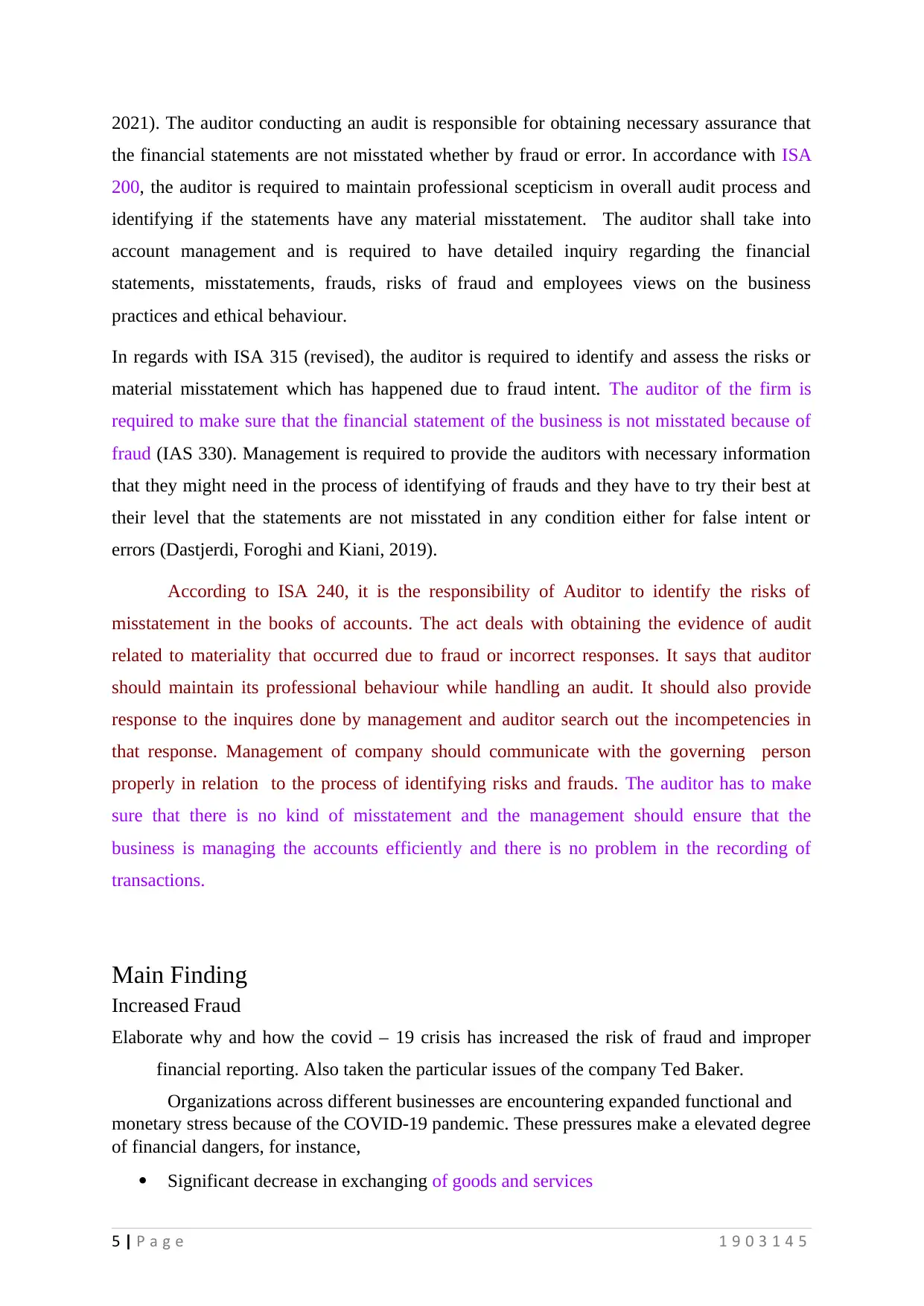
2021). The auditor conducting an audit is responsible for obtaining necessary assurance that
the financial statements are not misstated whether by fraud or error. In accordance with ISA
200, the auditor is required to maintain professional scepticism in overall audit process and
identifying if the statements have any material misstatement. The auditor shall take into
account management and is required to have detailed inquiry regarding the financial
statements, misstatements, frauds, risks of fraud and employees views on the business
practices and ethical behaviour.
In regards with ISA 315 (revised), the auditor is required to identify and assess the risks or
material misstatement which has happened due to fraud intent. The auditor of the firm is
required to make sure that the financial statement of the business is not misstated because of
fraud (IAS 330). Management is required to provide the auditors with necessary information
that they might need in the process of identifying of frauds and they have to try their best at
their level that the statements are not misstated in any condition either for false intent or
errors (Dastjerdi, Foroghi and Kiani, 2019).
According to ISA 240, it is the responsibility of Auditor to identify the risks of
misstatement in the books of accounts. The act deals with obtaining the evidence of audit
related to materiality that occurred due to fraud or incorrect responses. It says that auditor
should maintain its professional behaviour while handling an audit. It should also provide
response to the inquires done by management and auditor search out the incompetencies in
that response. Management of company should communicate with the governing person
properly in relation to the process of identifying risks and frauds. The auditor has to make
sure that there is no kind of misstatement and the management should ensure that the
business is managing the accounts efficiently and there is no problem in the recording of
transactions.
Main Finding
Increased Fraud
Elaborate why and how the covid – 19 crisis has increased the risk of fraud and improper
financial reporting. Also taken the particular issues of the company Ted Baker.
Organizations across different businesses are encountering expanded functional and
monetary stress because of the COVID-19 pandemic. These pressures make a elevated degree
of financial dangers, for instance,
Significant decrease in exchanging of goods and services
5 | P a g e 1 9 0 3 1 4 5
the financial statements are not misstated whether by fraud or error. In accordance with ISA
200, the auditor is required to maintain professional scepticism in overall audit process and
identifying if the statements have any material misstatement. The auditor shall take into
account management and is required to have detailed inquiry regarding the financial
statements, misstatements, frauds, risks of fraud and employees views on the business
practices and ethical behaviour.
In regards with ISA 315 (revised), the auditor is required to identify and assess the risks or
material misstatement which has happened due to fraud intent. The auditor of the firm is
required to make sure that the financial statement of the business is not misstated because of
fraud (IAS 330). Management is required to provide the auditors with necessary information
that they might need in the process of identifying of frauds and they have to try their best at
their level that the statements are not misstated in any condition either for false intent or
errors (Dastjerdi, Foroghi and Kiani, 2019).
According to ISA 240, it is the responsibility of Auditor to identify the risks of
misstatement in the books of accounts. The act deals with obtaining the evidence of audit
related to materiality that occurred due to fraud or incorrect responses. It says that auditor
should maintain its professional behaviour while handling an audit. It should also provide
response to the inquires done by management and auditor search out the incompetencies in
that response. Management of company should communicate with the governing person
properly in relation to the process of identifying risks and frauds. The auditor has to make
sure that there is no kind of misstatement and the management should ensure that the
business is managing the accounts efficiently and there is no problem in the recording of
transactions.
Main Finding
Increased Fraud
Elaborate why and how the covid – 19 crisis has increased the risk of fraud and improper
financial reporting. Also taken the particular issues of the company Ted Baker.
Organizations across different businesses are encountering expanded functional and
monetary stress because of the COVID-19 pandemic. These pressures make a elevated degree
of financial dangers, for instance,
Significant decrease in exchanging of goods and services
5 | P a g e 1 9 0 3 1 4 5
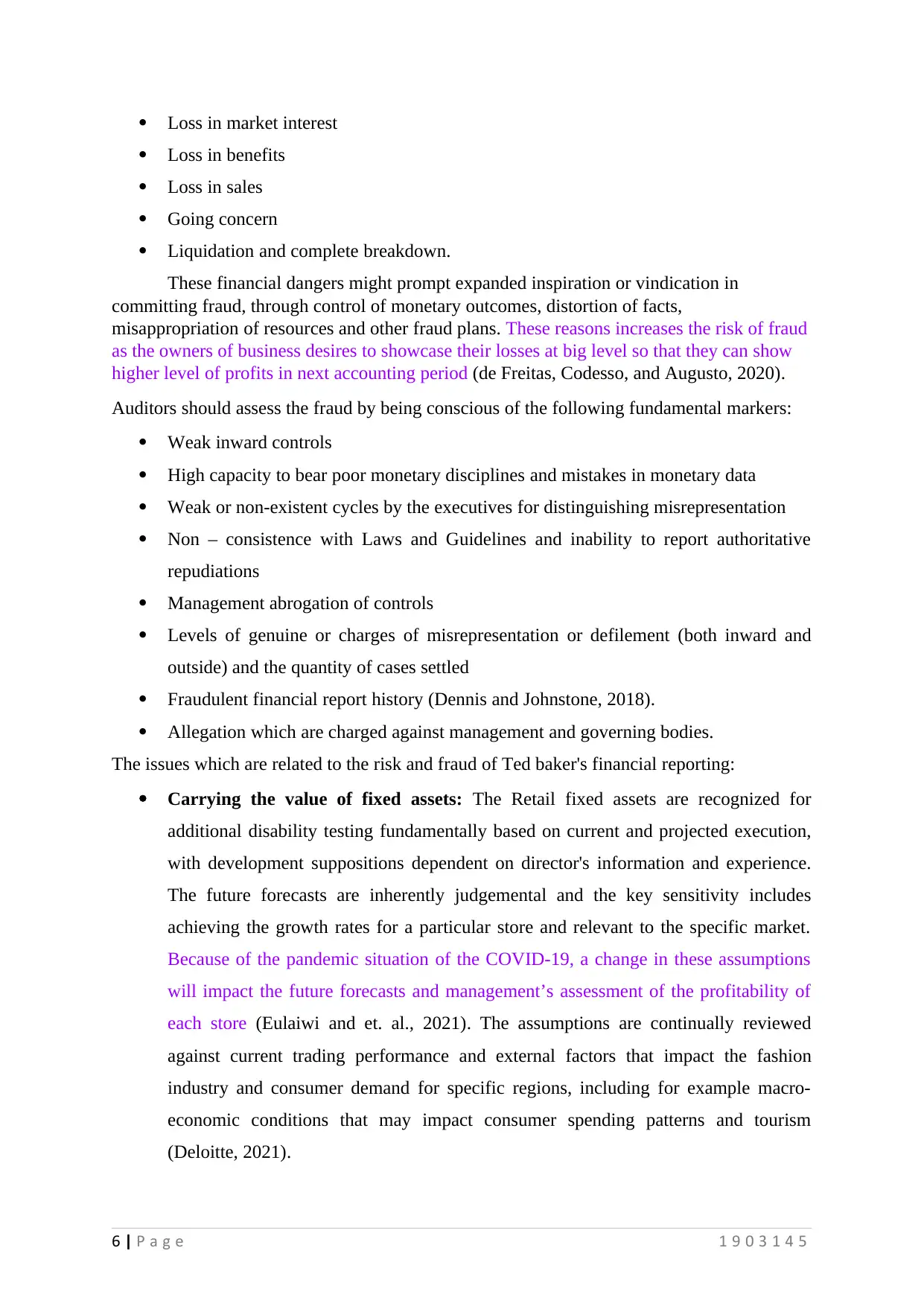
Loss in market interest
Loss in benefits
Loss in sales
Going concern
Liquidation and complete breakdown.
These financial dangers might prompt expanded inspiration or vindication in
committing fraud, through control of monetary outcomes, distortion of facts,
misappropriation of resources and other fraud plans. These reasons increases the risk of fraud
as the owners of business desires to showcase their losses at big level so that they can show
higher level of profits in next accounting period (de Freitas, Codesso, and Augusto, 2020).
Auditors should assess the fraud by being conscious of the following fundamental markers:
Weak inward controls
High capacity to bear poor monetary disciplines and mistakes in monetary data
Weak or non-existent cycles by the executives for distinguishing misrepresentation
Non – consistence with Laws and Guidelines and inability to report authoritative
repudiations
Management abrogation of controls
Levels of genuine or charges of misrepresentation or defilement (both inward and
outside) and the quantity of cases settled
Fraudulent financial report history (Dennis and Johnstone, 2018).
Allegation which are charged against management and governing bodies.
The issues which are related to the risk and fraud of Ted baker's financial reporting:
Carrying the value of fixed assets: The Retail fixed assets are recognized for
additional disability testing fundamentally based on current and projected execution,
with development suppositions dependent on director's information and experience.
The future forecasts are inherently judgemental and the key sensitivity includes
achieving the growth rates for a particular store and relevant to the specific market.
Because of the pandemic situation of the COVID-19, a change in these assumptions
will impact the future forecasts and management’s assessment of the profitability of
each store (Eulaiwi and et. al., 2021). The assumptions are continually reviewed
against current trading performance and external factors that impact the fashion
industry and consumer demand for specific regions, including for example macro-
economic conditions that may impact consumer spending patterns and tourism
(Deloitte, 2021).
6 | P a g e 1 9 0 3 1 4 5
Loss in benefits
Loss in sales
Going concern
Liquidation and complete breakdown.
These financial dangers might prompt expanded inspiration or vindication in
committing fraud, through control of monetary outcomes, distortion of facts,
misappropriation of resources and other fraud plans. These reasons increases the risk of fraud
as the owners of business desires to showcase their losses at big level so that they can show
higher level of profits in next accounting period (de Freitas, Codesso, and Augusto, 2020).
Auditors should assess the fraud by being conscious of the following fundamental markers:
Weak inward controls
High capacity to bear poor monetary disciplines and mistakes in monetary data
Weak or non-existent cycles by the executives for distinguishing misrepresentation
Non – consistence with Laws and Guidelines and inability to report authoritative
repudiations
Management abrogation of controls
Levels of genuine or charges of misrepresentation or defilement (both inward and
outside) and the quantity of cases settled
Fraudulent financial report history (Dennis and Johnstone, 2018).
Allegation which are charged against management and governing bodies.
The issues which are related to the risk and fraud of Ted baker's financial reporting:
Carrying the value of fixed assets: The Retail fixed assets are recognized for
additional disability testing fundamentally based on current and projected execution,
with development suppositions dependent on director's information and experience.
The future forecasts are inherently judgemental and the key sensitivity includes
achieving the growth rates for a particular store and relevant to the specific market.
Because of the pandemic situation of the COVID-19, a change in these assumptions
will impact the future forecasts and management’s assessment of the profitability of
each store (Eulaiwi and et. al., 2021). The assumptions are continually reviewed
against current trading performance and external factors that impact the fashion
industry and consumer demand for specific regions, including for example macro-
economic conditions that may impact consumer spending patterns and tourism
(Deloitte, 2021).
6 | P a g e 1 9 0 3 1 4 5
⊘ This is a preview!⊘
Do you want full access?
Subscribe today to unlock all pages.

Trusted by 1+ million students worldwide
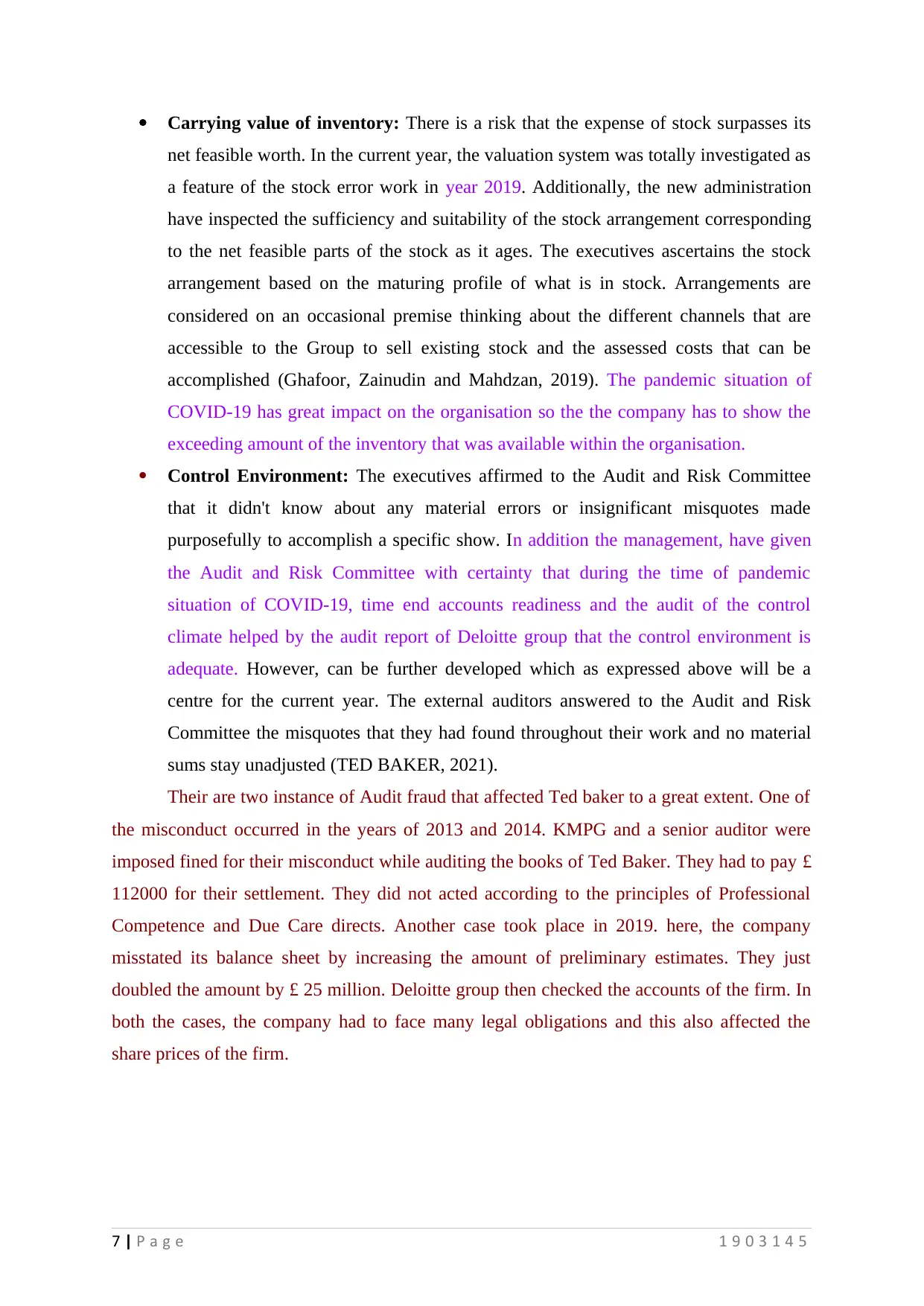
Carrying value of inventory: There is a risk that the expense of stock surpasses its
net feasible worth. In the current year, the valuation system was totally investigated as
a feature of the stock error work in year 2019. Additionally, the new administration
have inspected the sufficiency and suitability of the stock arrangement corresponding
to the net feasible parts of the stock as it ages. The executives ascertains the stock
arrangement based on the maturing profile of what is in stock. Arrangements are
considered on an occasional premise thinking about the different channels that are
accessible to the Group to sell existing stock and the assessed costs that can be
accomplished (Ghafoor, Zainudin and Mahdzan, 2019). The pandemic situation of
COVID-19 has great impact on the organisation so the the company has to show the
exceeding amount of the inventory that was available within the organisation.
Control Environment: The executives affirmed to the Audit and Risk Committee
that it didn't know about any material errors or insignificant misquotes made
purposefully to accomplish a specific show. In addition the management, have given
the Audit and Risk Committee with certainty that during the time of pandemic
situation of COVID-19, time end accounts readiness and the audit of the control
climate helped by the audit report of Deloitte group that the control environment is
adequate. However, can be further developed which as expressed above will be a
centre for the current year. The external auditors answered to the Audit and Risk
Committee the misquotes that they had found throughout their work and no material
sums stay unadjusted (TED BAKER, 2021).
Their are two instance of Audit fraud that affected Ted baker to a great extent. One of
the misconduct occurred in the years of 2013 and 2014. KMPG and a senior auditor were
imposed fined for their misconduct while auditing the books of Ted Baker. They had to pay £
112000 for their settlement. They did not acted according to the principles of Professional
Competence and Due Care directs. Another case took place in 2019. here, the company
misstated its balance sheet by increasing the amount of preliminary estimates. They just
doubled the amount by £ 25 million. Deloitte group then checked the accounts of the firm. In
both the cases, the company had to face many legal obligations and this also affected the
share prices of the firm.
7 | P a g e 1 9 0 3 1 4 5
net feasible worth. In the current year, the valuation system was totally investigated as
a feature of the stock error work in year 2019. Additionally, the new administration
have inspected the sufficiency and suitability of the stock arrangement corresponding
to the net feasible parts of the stock as it ages. The executives ascertains the stock
arrangement based on the maturing profile of what is in stock. Arrangements are
considered on an occasional premise thinking about the different channels that are
accessible to the Group to sell existing stock and the assessed costs that can be
accomplished (Ghafoor, Zainudin and Mahdzan, 2019). The pandemic situation of
COVID-19 has great impact on the organisation so the the company has to show the
exceeding amount of the inventory that was available within the organisation.
Control Environment: The executives affirmed to the Audit and Risk Committee
that it didn't know about any material errors or insignificant misquotes made
purposefully to accomplish a specific show. In addition the management, have given
the Audit and Risk Committee with certainty that during the time of pandemic
situation of COVID-19, time end accounts readiness and the audit of the control
climate helped by the audit report of Deloitte group that the control environment is
adequate. However, can be further developed which as expressed above will be a
centre for the current year. The external auditors answered to the Audit and Risk
Committee the misquotes that they had found throughout their work and no material
sums stay unadjusted (TED BAKER, 2021).
Their are two instance of Audit fraud that affected Ted baker to a great extent. One of
the misconduct occurred in the years of 2013 and 2014. KMPG and a senior auditor were
imposed fined for their misconduct while auditing the books of Ted Baker. They had to pay £
112000 for their settlement. They did not acted according to the principles of Professional
Competence and Due Care directs. Another case took place in 2019. here, the company
misstated its balance sheet by increasing the amount of preliminary estimates. They just
doubled the amount by £ 25 million. Deloitte group then checked the accounts of the firm. In
both the cases, the company had to face many legal obligations and this also affected the
share prices of the firm.
7 | P a g e 1 9 0 3 1 4 5
Paraphrase This Document
Need a fresh take? Get an instant paraphrase of this document with our AI Paraphraser
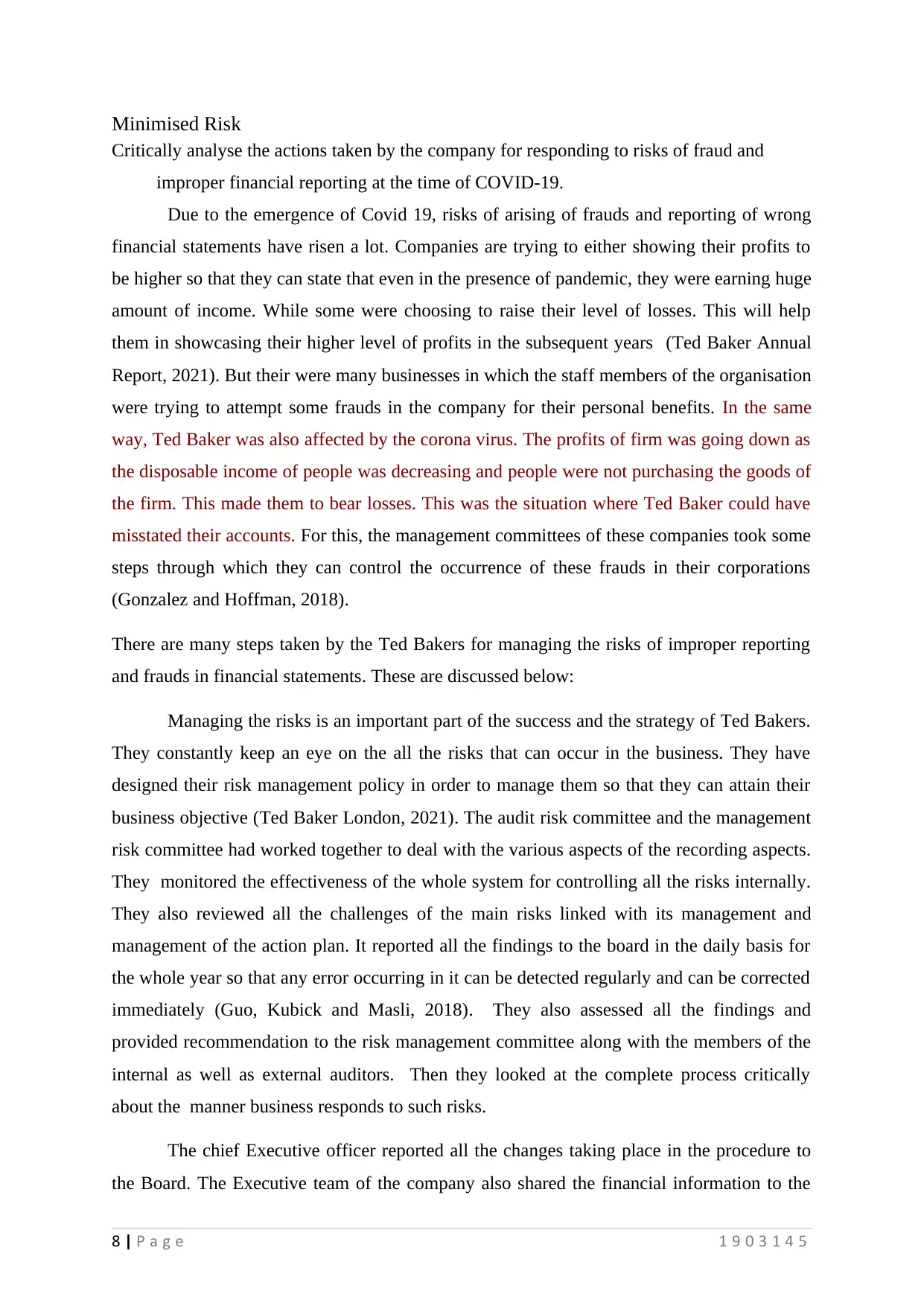
Minimised Risk
Critically analyse the actions taken by the company for responding to risks of fraud and
improper financial reporting at the time of COVID-19.
Due to the emergence of Covid 19, risks of arising of frauds and reporting of wrong
financial statements have risen a lot. Companies are trying to either showing their profits to
be higher so that they can state that even in the presence of pandemic, they were earning huge
amount of income. While some were choosing to raise their level of losses. This will help
them in showcasing their higher level of profits in the subsequent years (Ted Baker Annual
Report, 2021). But their were many businesses in which the staff members of the organisation
were trying to attempt some frauds in the company for their personal benefits. In the same
way, Ted Baker was also affected by the corona virus. The profits of firm was going down as
the disposable income of people was decreasing and people were not purchasing the goods of
the firm. This made them to bear losses. This was the situation where Ted Baker could have
misstated their accounts. For this, the management committees of these companies took some
steps through which they can control the occurrence of these frauds in their corporations
(Gonzalez and Hoffman, 2018).
There are many steps taken by the Ted Bakers for managing the risks of improper reporting
and frauds in financial statements. These are discussed below:
Managing the risks is an important part of the success and the strategy of Ted Bakers.
They constantly keep an eye on the all the risks that can occur in the business. They have
designed their risk management policy in order to manage them so that they can attain their
business objective (Ted Baker London, 2021). The audit risk committee and the management
risk committee had worked together to deal with the various aspects of the recording aspects.
They monitored the effectiveness of the whole system for controlling all the risks internally.
They also reviewed all the challenges of the main risks linked with its management and
management of the action plan. It reported all the findings to the board in the daily basis for
the whole year so that any error occurring in it can be detected regularly and can be corrected
immediately (Guo, Kubick and Masli, 2018). They also assessed all the findings and
provided recommendation to the risk management committee along with the members of the
internal as well as external auditors. Then they looked at the complete process critically
about the manner business responds to such risks.
The chief Executive officer reported all the changes taking place in the procedure to
the Board. The Executive team of the company also shared the financial information to the
8 | P a g e 1 9 0 3 1 4 5
Critically analyse the actions taken by the company for responding to risks of fraud and
improper financial reporting at the time of COVID-19.
Due to the emergence of Covid 19, risks of arising of frauds and reporting of wrong
financial statements have risen a lot. Companies are trying to either showing their profits to
be higher so that they can state that even in the presence of pandemic, they were earning huge
amount of income. While some were choosing to raise their level of losses. This will help
them in showcasing their higher level of profits in the subsequent years (Ted Baker Annual
Report, 2021). But their were many businesses in which the staff members of the organisation
were trying to attempt some frauds in the company for their personal benefits. In the same
way, Ted Baker was also affected by the corona virus. The profits of firm was going down as
the disposable income of people was decreasing and people were not purchasing the goods of
the firm. This made them to bear losses. This was the situation where Ted Baker could have
misstated their accounts. For this, the management committees of these companies took some
steps through which they can control the occurrence of these frauds in their corporations
(Gonzalez and Hoffman, 2018).
There are many steps taken by the Ted Bakers for managing the risks of improper reporting
and frauds in financial statements. These are discussed below:
Managing the risks is an important part of the success and the strategy of Ted Bakers.
They constantly keep an eye on the all the risks that can occur in the business. They have
designed their risk management policy in order to manage them so that they can attain their
business objective (Ted Baker London, 2021). The audit risk committee and the management
risk committee had worked together to deal with the various aspects of the recording aspects.
They monitored the effectiveness of the whole system for controlling all the risks internally.
They also reviewed all the challenges of the main risks linked with its management and
management of the action plan. It reported all the findings to the board in the daily basis for
the whole year so that any error occurring in it can be detected regularly and can be corrected
immediately (Guo, Kubick and Masli, 2018). They also assessed all the findings and
provided recommendation to the risk management committee along with the members of the
internal as well as external auditors. Then they looked at the complete process critically
about the manner business responds to such risks.
The chief Executive officer reported all the changes taking place in the procedure to
the Board. The Executive team of the company also shared the financial information to the
8 | P a g e 1 9 0 3 1 4 5
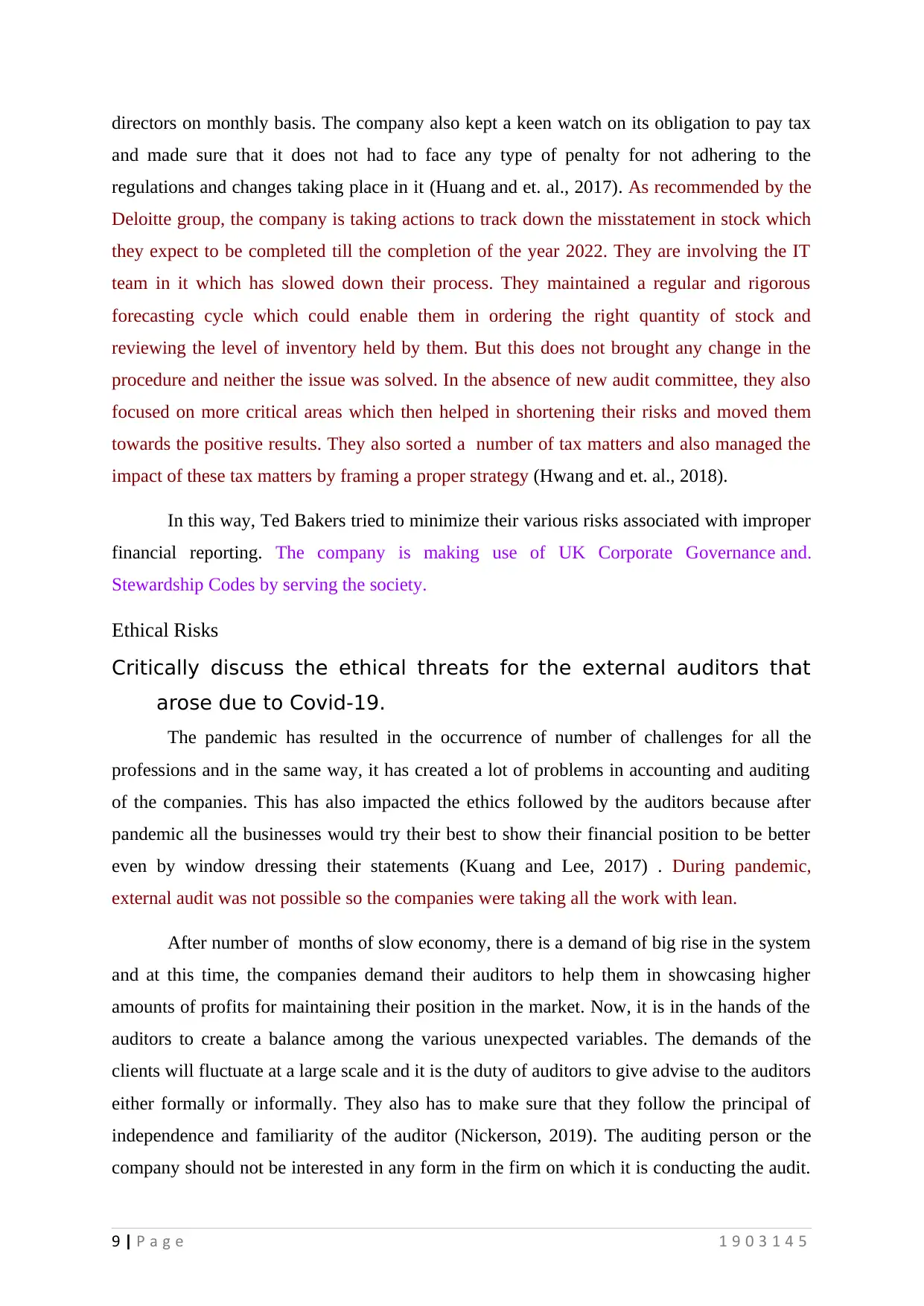
directors on monthly basis. The company also kept a keen watch on its obligation to pay tax
and made sure that it does not had to face any type of penalty for not adhering to the
regulations and changes taking place in it (Huang and et. al., 2017). As recommended by the
Deloitte group, the company is taking actions to track down the misstatement in stock which
they expect to be completed till the completion of the year 2022. They are involving the IT
team in it which has slowed down their process. They maintained a regular and rigorous
forecasting cycle which could enable them in ordering the right quantity of stock and
reviewing the level of inventory held by them. But this does not brought any change in the
procedure and neither the issue was solved. In the absence of new audit committee, they also
focused on more critical areas which then helped in shortening their risks and moved them
towards the positive results. They also sorted a number of tax matters and also managed the
impact of these tax matters by framing a proper strategy (Hwang and et. al., 2018).
In this way, Ted Bakers tried to minimize their various risks associated with improper
financial reporting. The company is making use of UK Corporate Governance and.
Stewardship Codes by serving the society.
Ethical Risks
Critically discuss the ethical threats for the external auditors that
arose due to Covid-19.
The pandemic has resulted in the occurrence of number of challenges for all the
professions and in the same way, it has created a lot of problems in accounting and auditing
of the companies. This has also impacted the ethics followed by the auditors because after
pandemic all the businesses would try their best to show their financial position to be better
even by window dressing their statements (Kuang and Lee, 2017) . During pandemic,
external audit was not possible so the companies were taking all the work with lean.
After number of months of slow economy, there is a demand of big rise in the system
and at this time, the companies demand their auditors to help them in showcasing higher
amounts of profits for maintaining their position in the market. Now, it is in the hands of the
auditors to create a balance among the various unexpected variables. The demands of the
clients will fluctuate at a large scale and it is the duty of auditors to give advise to the auditors
either formally or informally. They also has to make sure that they follow the principal of
independence and familiarity of the auditor (Nickerson, 2019). The auditing person or the
company should not be interested in any form in the firm on which it is conducting the audit.
9 | P a g e 1 9 0 3 1 4 5
and made sure that it does not had to face any type of penalty for not adhering to the
regulations and changes taking place in it (Huang and et. al., 2017). As recommended by the
Deloitte group, the company is taking actions to track down the misstatement in stock which
they expect to be completed till the completion of the year 2022. They are involving the IT
team in it which has slowed down their process. They maintained a regular and rigorous
forecasting cycle which could enable them in ordering the right quantity of stock and
reviewing the level of inventory held by them. But this does not brought any change in the
procedure and neither the issue was solved. In the absence of new audit committee, they also
focused on more critical areas which then helped in shortening their risks and moved them
towards the positive results. They also sorted a number of tax matters and also managed the
impact of these tax matters by framing a proper strategy (Hwang and et. al., 2018).
In this way, Ted Bakers tried to minimize their various risks associated with improper
financial reporting. The company is making use of UK Corporate Governance and.
Stewardship Codes by serving the society.
Ethical Risks
Critically discuss the ethical threats for the external auditors that
arose due to Covid-19.
The pandemic has resulted in the occurrence of number of challenges for all the
professions and in the same way, it has created a lot of problems in accounting and auditing
of the companies. This has also impacted the ethics followed by the auditors because after
pandemic all the businesses would try their best to show their financial position to be better
even by window dressing their statements (Kuang and Lee, 2017) . During pandemic,
external audit was not possible so the companies were taking all the work with lean.
After number of months of slow economy, there is a demand of big rise in the system
and at this time, the companies demand their auditors to help them in showcasing higher
amounts of profits for maintaining their position in the market. Now, it is in the hands of the
auditors to create a balance among the various unexpected variables. The demands of the
clients will fluctuate at a large scale and it is the duty of auditors to give advise to the auditors
either formally or informally. They also has to make sure that they follow the principal of
independence and familiarity of the auditor (Nickerson, 2019). The auditing person or the
company should not be interested in any form in the firm on which it is conducting the audit.
9 | P a g e 1 9 0 3 1 4 5
⊘ This is a preview!⊘
Do you want full access?
Subscribe today to unlock all pages.

Trusted by 1+ million students worldwide
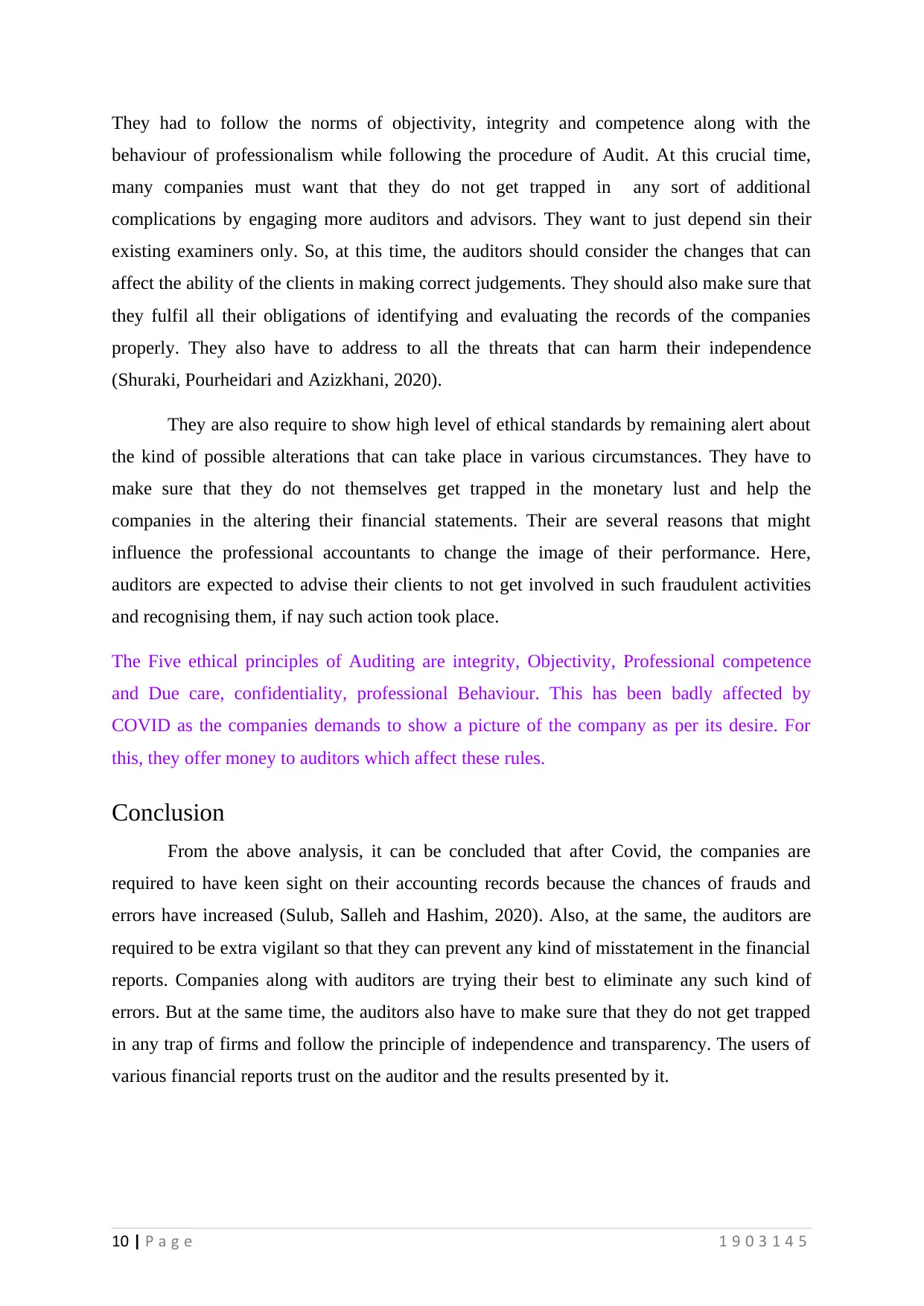
They had to follow the norms of objectivity, integrity and competence along with the
behaviour of professionalism while following the procedure of Audit. At this crucial time,
many companies must want that they do not get trapped in any sort of additional
complications by engaging more auditors and advisors. They want to just depend sin their
existing examiners only. So, at this time, the auditors should consider the changes that can
affect the ability of the clients in making correct judgements. They should also make sure that
they fulfil all their obligations of identifying and evaluating the records of the companies
properly. They also have to address to all the threats that can harm their independence
(Shuraki, Pourheidari and Azizkhani, 2020).
They are also require to show high level of ethical standards by remaining alert about
the kind of possible alterations that can take place in various circumstances. They have to
make sure that they do not themselves get trapped in the monetary lust and help the
companies in the altering their financial statements. Their are several reasons that might
influence the professional accountants to change the image of their performance. Here,
auditors are expected to advise their clients to not get involved in such fraudulent activities
and recognising them, if nay such action took place.
The Five ethical principles of Auditing are integrity, Objectivity, Professional competence
and Due care, confidentiality, professional Behaviour. This has been badly affected by
COVID as the companies demands to show a picture of the company as per its desire. For
this, they offer money to auditors which affect these rules.
Conclusion
From the above analysis, it can be concluded that after Covid, the companies are
required to have keen sight on their accounting records because the chances of frauds and
errors have increased (Sulub, Salleh and Hashim, 2020). Also, at the same, the auditors are
required to be extra vigilant so that they can prevent any kind of misstatement in the financial
reports. Companies along with auditors are trying their best to eliminate any such kind of
errors. But at the same time, the auditors also have to make sure that they do not get trapped
in any trap of firms and follow the principle of independence and transparency. The users of
various financial reports trust on the auditor and the results presented by it.
10 | P a g e 1 9 0 3 1 4 5
behaviour of professionalism while following the procedure of Audit. At this crucial time,
many companies must want that they do not get trapped in any sort of additional
complications by engaging more auditors and advisors. They want to just depend sin their
existing examiners only. So, at this time, the auditors should consider the changes that can
affect the ability of the clients in making correct judgements. They should also make sure that
they fulfil all their obligations of identifying and evaluating the records of the companies
properly. They also have to address to all the threats that can harm their independence
(Shuraki, Pourheidari and Azizkhani, 2020).
They are also require to show high level of ethical standards by remaining alert about
the kind of possible alterations that can take place in various circumstances. They have to
make sure that they do not themselves get trapped in the monetary lust and help the
companies in the altering their financial statements. Their are several reasons that might
influence the professional accountants to change the image of their performance. Here,
auditors are expected to advise their clients to not get involved in such fraudulent activities
and recognising them, if nay such action took place.
The Five ethical principles of Auditing are integrity, Objectivity, Professional competence
and Due care, confidentiality, professional Behaviour. This has been badly affected by
COVID as the companies demands to show a picture of the company as per its desire. For
this, they offer money to auditors which affect these rules.
Conclusion
From the above analysis, it can be concluded that after Covid, the companies are
required to have keen sight on their accounting records because the chances of frauds and
errors have increased (Sulub, Salleh and Hashim, 2020). Also, at the same, the auditors are
required to be extra vigilant so that they can prevent any kind of misstatement in the financial
reports. Companies along with auditors are trying their best to eliminate any such kind of
errors. But at the same time, the auditors also have to make sure that they do not get trapped
in any trap of firms and follow the principle of independence and transparency. The users of
various financial reports trust on the auditor and the results presented by it.
10 | P a g e 1 9 0 3 1 4 5
Paraphrase This Document
Need a fresh take? Get an instant paraphrase of this document with our AI Paraphraser
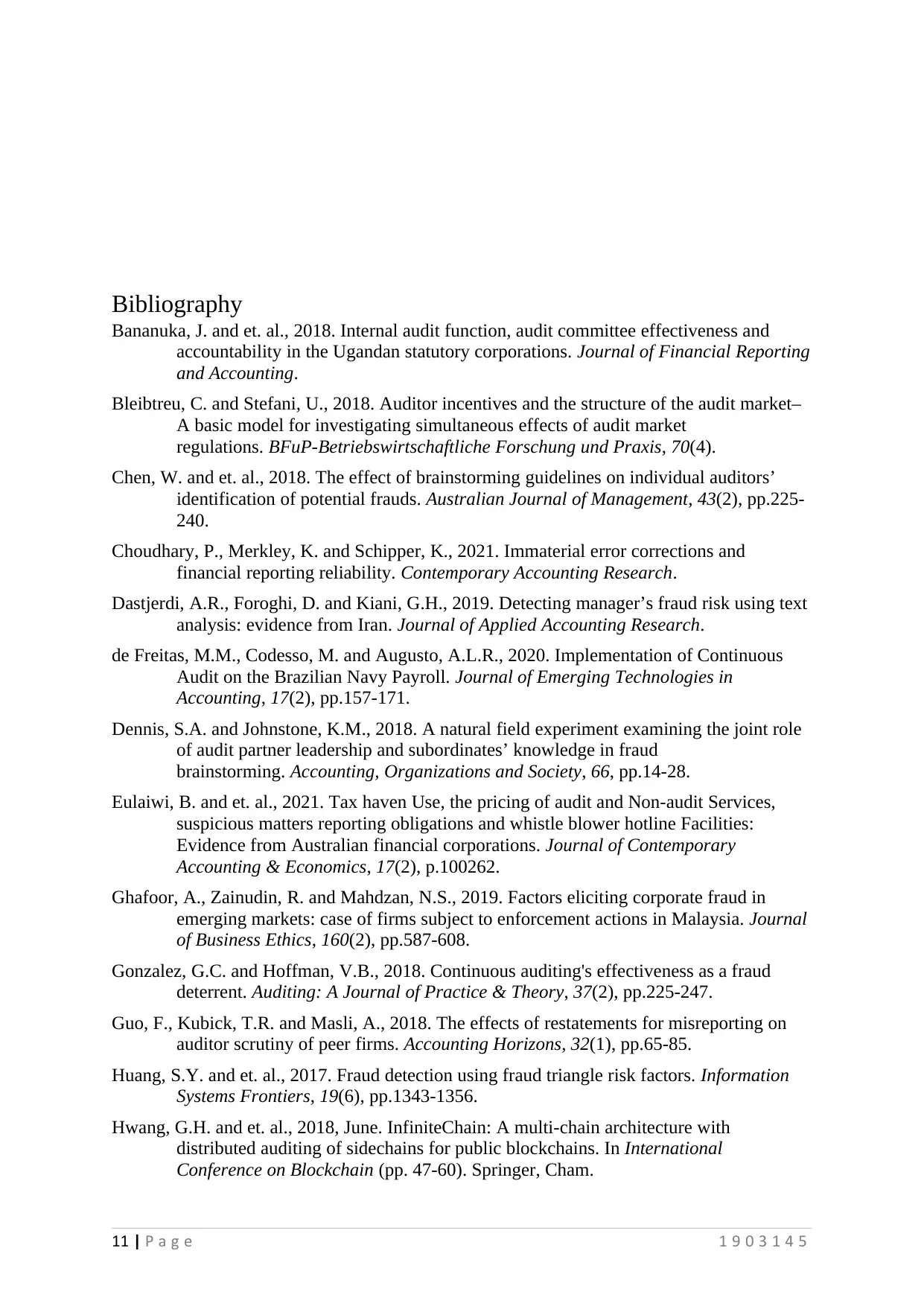
Bibliography
Bananuka, J. and et. al., 2018. Internal audit function, audit committee effectiveness and
accountability in the Ugandan statutory corporations. Journal of Financial Reporting
and Accounting.
Bleibtreu, C. and Stefani, U., 2018. Auditor incentives and the structure of the audit market–
A basic model for investigating simultaneous effects of audit market
regulations. BFuP-Betriebswirtschaftliche Forschung und Praxis, 70(4).
Chen, W. and et. al., 2018. The effect of brainstorming guidelines on individual auditors’
identification of potential frauds. Australian Journal of Management, 43(2), pp.225-
240.
Choudhary, P., Merkley, K. and Schipper, K., 2021. Immaterial error corrections and
financial reporting reliability. Contemporary Accounting Research.
Dastjerdi, A.R., Foroghi, D. and Kiani, G.H., 2019. Detecting manager’s fraud risk using text
analysis: evidence from Iran. Journal of Applied Accounting Research.
de Freitas, M.M., Codesso, M. and Augusto, A.L.R., 2020. Implementation of Continuous
Audit on the Brazilian Navy Payroll. Journal of Emerging Technologies in
Accounting, 17(2), pp.157-171.
Dennis, S.A. and Johnstone, K.M., 2018. A natural field experiment examining the joint role
of audit partner leadership and subordinates’ knowledge in fraud
brainstorming. Accounting, Organizations and Society, 66, pp.14-28.
Eulaiwi, B. and et. al., 2021. Tax haven Use, the pricing of audit and Non-audit Services,
suspicious matters reporting obligations and whistle blower hotline Facilities:
Evidence from Australian financial corporations. Journal of Contemporary
Accounting & Economics, 17(2), p.100262.
Ghafoor, A., Zainudin, R. and Mahdzan, N.S., 2019. Factors eliciting corporate fraud in
emerging markets: case of firms subject to enforcement actions in Malaysia. Journal
of Business Ethics, 160(2), pp.587-608.
Gonzalez, G.C. and Hoffman, V.B., 2018. Continuous auditing's effectiveness as a fraud
deterrent. Auditing: A Journal of Practice & Theory, 37(2), pp.225-247.
Guo, F., Kubick, T.R. and Masli, A., 2018. The effects of restatements for misreporting on
auditor scrutiny of peer firms. Accounting Horizons, 32(1), pp.65-85.
Huang, S.Y. and et. al., 2017. Fraud detection using fraud triangle risk factors. Information
Systems Frontiers, 19(6), pp.1343-1356.
Hwang, G.H. and et. al., 2018, June. InfiniteChain: A multi-chain architecture with
distributed auditing of sidechains for public blockchains. In International
Conference on Blockchain (pp. 47-60). Springer, Cham.
11 | P a g e 1 9 0 3 1 4 5
Bananuka, J. and et. al., 2018. Internal audit function, audit committee effectiveness and
accountability in the Ugandan statutory corporations. Journal of Financial Reporting
and Accounting.
Bleibtreu, C. and Stefani, U., 2018. Auditor incentives and the structure of the audit market–
A basic model for investigating simultaneous effects of audit market
regulations. BFuP-Betriebswirtschaftliche Forschung und Praxis, 70(4).
Chen, W. and et. al., 2018. The effect of brainstorming guidelines on individual auditors’
identification of potential frauds. Australian Journal of Management, 43(2), pp.225-
240.
Choudhary, P., Merkley, K. and Schipper, K., 2021. Immaterial error corrections and
financial reporting reliability. Contemporary Accounting Research.
Dastjerdi, A.R., Foroghi, D. and Kiani, G.H., 2019. Detecting manager’s fraud risk using text
analysis: evidence from Iran. Journal of Applied Accounting Research.
de Freitas, M.M., Codesso, M. and Augusto, A.L.R., 2020. Implementation of Continuous
Audit on the Brazilian Navy Payroll. Journal of Emerging Technologies in
Accounting, 17(2), pp.157-171.
Dennis, S.A. and Johnstone, K.M., 2018. A natural field experiment examining the joint role
of audit partner leadership and subordinates’ knowledge in fraud
brainstorming. Accounting, Organizations and Society, 66, pp.14-28.
Eulaiwi, B. and et. al., 2021. Tax haven Use, the pricing of audit and Non-audit Services,
suspicious matters reporting obligations and whistle blower hotline Facilities:
Evidence from Australian financial corporations. Journal of Contemporary
Accounting & Economics, 17(2), p.100262.
Ghafoor, A., Zainudin, R. and Mahdzan, N.S., 2019. Factors eliciting corporate fraud in
emerging markets: case of firms subject to enforcement actions in Malaysia. Journal
of Business Ethics, 160(2), pp.587-608.
Gonzalez, G.C. and Hoffman, V.B., 2018. Continuous auditing's effectiveness as a fraud
deterrent. Auditing: A Journal of Practice & Theory, 37(2), pp.225-247.
Guo, F., Kubick, T.R. and Masli, A., 2018. The effects of restatements for misreporting on
auditor scrutiny of peer firms. Accounting Horizons, 32(1), pp.65-85.
Huang, S.Y. and et. al., 2017. Fraud detection using fraud triangle risk factors. Information
Systems Frontiers, 19(6), pp.1343-1356.
Hwang, G.H. and et. al., 2018, June. InfiniteChain: A multi-chain architecture with
distributed auditing of sidechains for public blockchains. In International
Conference on Blockchain (pp. 47-60). Springer, Cham.
11 | P a g e 1 9 0 3 1 4 5
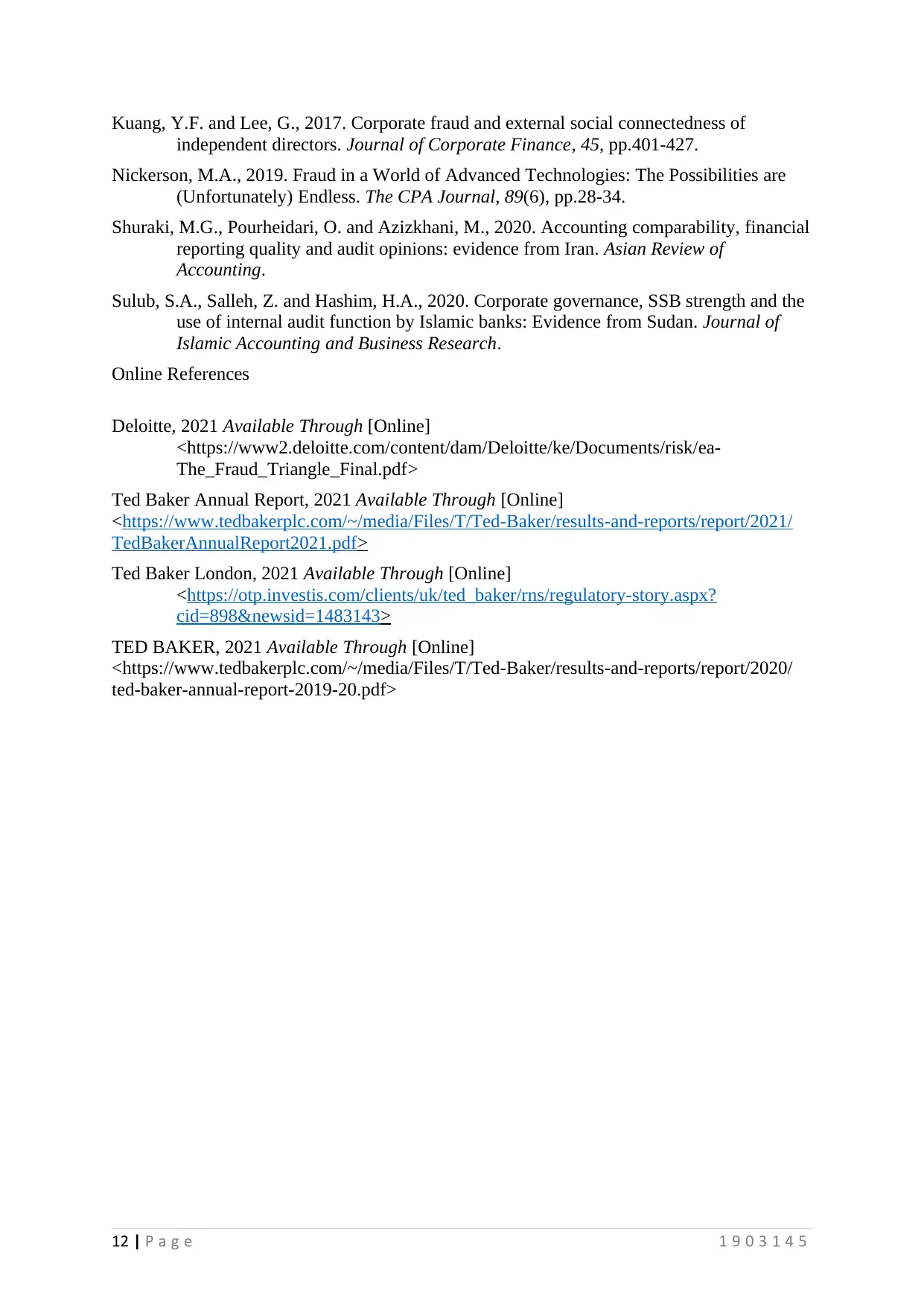
Kuang, Y.F. and Lee, G., 2017. Corporate fraud and external social connectedness of
independent directors. Journal of Corporate Finance, 45, pp.401-427.
Nickerson, M.A., 2019. Fraud in a World of Advanced Technologies: The Possibilities are
(Unfortunately) Endless. The CPA Journal, 89(6), pp.28-34.
Shuraki, M.G., Pourheidari, O. and Azizkhani, M., 2020. Accounting comparability, financial
reporting quality and audit opinions: evidence from Iran. Asian Review of
Accounting.
Sulub, S.A., Salleh, Z. and Hashim, H.A., 2020. Corporate governance, SSB strength and the
use of internal audit function by Islamic banks: Evidence from Sudan. Journal of
Islamic Accounting and Business Research.
Online References
Deloitte, 2021 Available Through [Online]
<https://www2.deloitte.com/content/dam/Deloitte/ke/Documents/risk/ea-
The_Fraud_Triangle_Final.pdf>
Ted Baker Annual Report, 2021 Available Through [Online]
<https://www.tedbakerplc.com/~/media/Files/T/Ted-Baker/results-and-reports/report/2021/
TedBakerAnnualReport2021.pdf>
Ted Baker London, 2021 Available Through [Online]
<https://otp.investis.com/clients/uk/ted_baker/rns/regulatory-story.aspx?
cid=898&newsid=1483143>
TED BAKER, 2021 Available Through [Online]
<https://www.tedbakerplc.com/~/media/Files/T/Ted-Baker/results-and-reports/report/2020/
ted-baker-annual-report-2019-20.pdf>
12 | P a g e 1 9 0 3 1 4 5
independent directors. Journal of Corporate Finance, 45, pp.401-427.
Nickerson, M.A., 2019. Fraud in a World of Advanced Technologies: The Possibilities are
(Unfortunately) Endless. The CPA Journal, 89(6), pp.28-34.
Shuraki, M.G., Pourheidari, O. and Azizkhani, M., 2020. Accounting comparability, financial
reporting quality and audit opinions: evidence from Iran. Asian Review of
Accounting.
Sulub, S.A., Salleh, Z. and Hashim, H.A., 2020. Corporate governance, SSB strength and the
use of internal audit function by Islamic banks: Evidence from Sudan. Journal of
Islamic Accounting and Business Research.
Online References
Deloitte, 2021 Available Through [Online]
<https://www2.deloitte.com/content/dam/Deloitte/ke/Documents/risk/ea-
The_Fraud_Triangle_Final.pdf>
Ted Baker Annual Report, 2021 Available Through [Online]
<https://www.tedbakerplc.com/~/media/Files/T/Ted-Baker/results-and-reports/report/2021/
TedBakerAnnualReport2021.pdf>
Ted Baker London, 2021 Available Through [Online]
<https://otp.investis.com/clients/uk/ted_baker/rns/regulatory-story.aspx?
cid=898&newsid=1483143>
TED BAKER, 2021 Available Through [Online]
<https://www.tedbakerplc.com/~/media/Files/T/Ted-Baker/results-and-reports/report/2020/
ted-baker-annual-report-2019-20.pdf>
12 | P a g e 1 9 0 3 1 4 5
⊘ This is a preview!⊘
Do you want full access?
Subscribe today to unlock all pages.

Trusted by 1+ million students worldwide
1 out of 12
Related Documents
Your All-in-One AI-Powered Toolkit for Academic Success.
+13062052269
info@desklib.com
Available 24*7 on WhatsApp / Email
![[object Object]](/_next/static/media/star-bottom.7253800d.svg)
Unlock your academic potential
Copyright © 2020–2026 A2Z Services. All Rights Reserved. Developed and managed by ZUCOL.





